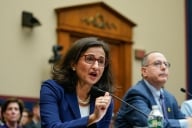You have /5 articles left.
Sign up for a free account or log in.

Grand Canyon U's arena in Phoenix
Grand Canyon U
Going nonprofit may not be a realistic option for the shrinking number of publicly traded for-profit institutions, if the failed attempt by Grand Canyon University is any indication.
The Christian for-profit has been a rare bright spot amid the sector’s steep decline in recent years. But about 18 months ago the Phoenix-based company said it would seek to convert to nonprofit status.
One key reason, Brian Mueller, the company’s CEO, said at the time, was a desire to avoid the “stigma” of being part of the sector, which has faced broad scrutiny and recent high-profile investigations and collapses.
“We have a lot more in common with traditional colleges that have a nonprofit status,” Mueller said in an interview on Friday.
Specifically, the company said a nonprofit conversion would allow it to accept philanthropic donations, pursue research grants and participate in governance of the National Collegiate Athletic Association. (The university is transitioning to the NCAA’s Division I, a first for a for-profit.)
Grand Canyon has been growing, with a business model that balances online education and a traditional campus.
At the end of last year, the university enrolled roughly 15,000 on its campus and another 60,000 online, according to corporate filings. Revenue from its online division -- Grand Canyon reeled in $210 million in operating revenue last year -- has allowed the company to spend more than $400 million on its Phoenix campus since going public eight years ago.
As a result, company officials said, the university no longer needs outside investment capital. So it sought to return to Grand Canyon’s “roots” as a nonprofit, having made the change to being a for-profit in 2004, when it was on the verge of bankruptcy as a private religious college.
To make the conversion, the university needed to apply to its regional accreditor, the Higher Learning Commission. The application process was labor-intensive, the company said. Yet officials were “reasonably confident” they could pull it off as recently as last month.
The optimism was tempered by acknowledgment of the stigma, however, the company said in a news release last week.
“Operating as a for-profit university, we are made aware daily of the adverse views many people have about for-profit institutions,” it wrote, “views that we believe, as it relates to Grand Canyon University, are most often expressed out of ignorance for what is going on at our university as well as out of competitive envy by those who feel threatened by our presence here and our undisputed success as a comprehensive university.”
The HLC rejected the plan, Grand Canyon announced last week, voting in February not to approve it.
Grand Canyon had proposed to create a new nonprofit “school corporation” and to house various functions of the company in a separate, unaccredited and for-profit “services corporation.” That structure is similar to those of smaller for-profits that previously have made the switch to nonprofit.
The commission, however, decided that the proposed structure would move too much of Grand Canyon’s academic operations to the for-profit division.
HLC said its requirements “do not allow for an institution to outsource all or the majority of its basic functions related to academic and student support services and curriculum development, even where the contract between the parties indicates that the accredited institution provides oversight of those services.”
In a statement, the HLC also said its current criteria require an accredited institution to have “both teaching and learning as well as service functions within the accredited structure.”
Fiery Response
Grand Canyon’s leaders do not agree the accrediting agency’s decision, and fired back with a strongly worded written statement and in interviews with journalists.
Mueller on Friday called the decision “stunning,” saying Grand Canyon had been “wronged” by its accreditor. “The outsourcing function in higher education is alive and well, and growing,” said Mueller. And he argued that his company’s plan would not have outsourced academics.
The university’s entire academic infrastructure, including all of its 4,500 faculty members, deans and the provost’s office, would have worked for the nonprofit division, the company said in its statement. And the nonprofit would have had direct responsibility and “absolute authority” over academics.
Grand Canyon said it based the plan on existing agreements between many colleges and for-profit vendors.
“We are at a loss to understand why the HLC board has chosen to reject our proposal alone, when so many of these agreements exist and are in effect, not only with other HLC-accredited schools in our local market but among top-tier regionally accredited institutions from coast to coast,” the company said.
Nonprofit colleges often contract with outside companies for services ranging from running dining halls to providing online degree content.
And some nonprofits even have created similar structures to the proposal by Grand Canyon. For example, Savannah College of Art and Design is a nonprofit with a separate, for-profit subsidiary, dubbed the SCAD Group Inc., which provides nonacademic services to the college.
Robert Shireman, a former official at the U.S. Department of Education, who has been a prominent critic of some for-profits, recently published a paper that questioned the legitimacy of nonprofit conversions by four for-profits.
Those institutions have become "covert for-profits," wrote Shireman, now a senior fellow with the Century Foundation, "where owners have managed to affix a nonprofit label to their colleges while engineering substantial ongoing personal financial benefits for themselves."
Mueller mentioned Shireman during an interview, saying his take had the “wrong starting point” and was “hurtful.”
Kevin Kinser, an expert on the for-profit sector, said the accreditor’s decision wasn’t entirely surprising.
“I always expected scrutiny of conversions like this to be high, and this is a particularly high-profile one to be considering at this point,” he said via email.
The outcome might have been different had Grand Canyon gone “fully nonprofit,” Kinser said, instead of maintaining a separate, related for-profit company.
But Kinser said he has long thought it would be tough for a publicly traded company to go nonprofit without creating some form of spin-off.
“I just don’t know of any institution in the U.S. that has been able to make the switch,” he said. “I thought it was because it was tough to do for financial reasons. But the HLC decision shows (I think) that it is also tough to maintain sufficient institutional integrity -- keeping the accredited entity 'the same' -- to maintain accreditation throughout.”
Trace Urdan, an analyst for Credit Suisse who has defended for-profits, said the HLC’s policy on academic outsourcing has not been consistently applied. For example, he cited an agreement between Cincinnati State Technical and Community College and Pearson, a large education company that will do student recruiting and retention for the community college.
“For-profit schools are not going to easily escape their model,” Urdan said in a written statement. “Creative efforts to unlock value by separating profit making from regulatory oversight may find that goal increasingly difficult to achieve.”
For its part, Grand Canyon said it is giving up on going nonprofit, for now at least. The company said it does not plan to challenge the HLC’s decision.
“We were doing this not for the short term,” said Mueller. “We were doing this for the long-term legacy of the institution.”








